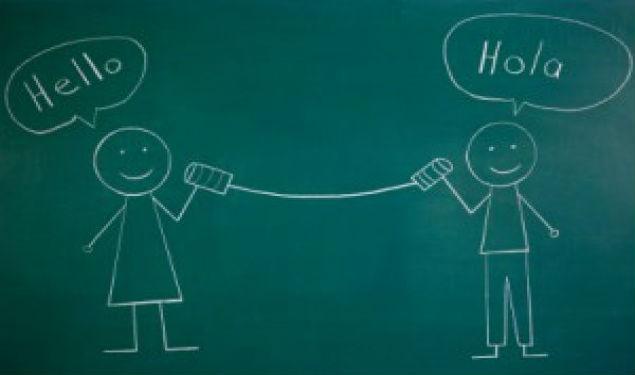
![]() Kathryn Stride
Kathryn Stride
When we talk about language we always think verbal communication or through sign language , but we shouldn’t forget that there is another way to communicate things. Sometimes we do so without even wanting to or realising it! It is our body language.
 Body language is our non-verbal communication. In a conversation face to face more than 65% of the information we pass on we do with our body - what we reveal to others through our gestures, postures or physical behavior.
Body language is our non-verbal communication. In a conversation face to face more than 65% of the information we pass on we do with our body - what we reveal to others through our gestures, postures or physical behavior.
It can reveal a lot of information to others about ourselves without needing to articulate words.
Body language is always present, voluntarily or involuntarily we are constantly transmitting signals and communicating with all that surrounds us. We could say it is a universal language, one that everyone transmits and with close enough attention one that anyone would be able to interpret without study, practice or translation. Perhaps stop and look at the details that make this non-verbal language, for example which poses the other person is adopting, the distance between you, how they move, their gestures, their expressions, their reactions. We use this observation of the physical behavior, in order to analyze the other person IE. We will create an impression based on feelings if the other person is lying, embarrassed, bored, tired, timid, nervous, relaxed, etc...
All of this has its importance in social relationships, dating, job interviews or any other position where we can be observed.
Our body speaks, so now you know you have to take into account the positions adopted and body signs that you show others, and at the same time more attention to the signals transmitted from the other person. And to help you to implement this in your next language exchange, here are some clues about body language:
If you want to create connection with someone right away the best way is to use a smile this breaks down the first barriers when physically meeting for the first time, in a more formal situation a greeting such us shaking hands also does this.
An upright posture shows confidence. The way we sit, and how we place our hands also shows our state of authority.
Our physical approach shows our signs of comfort, interest and attract to the other person. It is best to respect the personal space of the other person, don’t be too far away but also don’t get too close!
Look into the eyes frequently and directly, this shows respect, gives a sense of interest, and a positive and open attitude. People who constantly look sideways show signs of nervousness, distraction, lying or lack of interest.
Crossing your arms or legs is recognised as a negative gesture, as it can give the impression of being defensive, having a closed attitude or perhaps even being timid. The position of the arms is important to know if a person is more or less receptive.
Touching your face or neck constantly shows signs of lack of confidence, insecurity and most all that you are not being honest.
Rapid patter with your feet or hands, indicates impatience, nervousness, or that somehow you feel intimidated.
And a pretty clear sign, if you feel someone is touching you on purpose with their foot under the table, means that they are flirting with you!

![]() Kathryn Stride
Kathryn Stride
 To ensure that a language is learned naturally, spoken fluently and without an accent, try to start learning as soon as possible and in the most natural way possible.
To ensure that a language is learned naturally, spoken fluently and without an accent, try to start learning as soon as possible and in the most natural way possible.
The process of learning a foreign language should be done with the same ease as with our native language.
From an early age we learn to speak a language without need or presence of written text.
From babies we grow, watch and listen to our parents and try to imitate the sounds of the words. By repeating these sounds (without realising it) we´re practicing, adopting and improving the words. Gradually the words combine with each other to get little phrases and create meaning. These phrases at the same time, give way to the formation of small speeches, and so we develop more control over our mother tongue. We are learning to speak a language without involving written content.
With this in mind, when we try to learn a new language we should find all methods available to us that more resemble the way we learned our native language naturally.
If we are studying a language, we should also try to give ourselves all the possibilities that will help us grasp the language as soon as possible. To do this the main thing is to surround and immerse ourselves in the foreign language we want to learn.
Surround yourself as much as possible by doing the following in your new language:
Expose yourself to the new language you are learning as much as possible every day.
And if you can, only have dreams in your new language!

![]() Kathryn Stride
Kathryn Stride
 Everyone can learn a language if they try. It’s just a matter of motivation or need.
Everyone can learn a language if they try. It’s just a matter of motivation or need.
Providing suitable conditions and more than anything practicing the language are often the determining factors for good language learning.
Anyone can learn a foreign language, regardless of sex or age. It is true that as we grow older, it seems that it diminishes our ability to learn, but it is not a major issue, it's never too late!
Age could supposedly affect our pronunciation or accent, being more difficult to get rid of native accent when speaking a second language. The native language is more established in adults than in children. It may even be the case that children come to forget their mother tongue due to lack of use.
Age does not affect the functionality of vocabulary and grammar, as these tend to remain intact despite having an older age, but we have to take into account an increase in the difficulty of representation and production of sounds.
One thing in favour of language learning is that the practice of switching from one language to another slows down the negative effects of age on the brain.
How does being male or female influence language learning? According to various studies, it was found that the male brain and the female brain develop differently. It has always been said that the brain of man and woman is different!
Apparently, males and females follow different patterns in the use of the right or left parts of the brain when trying to speak a language. Although there is no confirmation on whether it is easier for males or females to learn.
An influential factor when it comes to learning a language is that people who are more outgoing improve faster than those who are timid. This is because the outgoing people don´t have fear when practicing the language, the timid end up practicing a lot less because they feel embarrassed they might get it wrong.
Learning a new language depends only on ourselves, our motivation, talent and how often we use the language. So keep practicing and have no fear!
©2024 LanguageLinker.com · All rights reserved